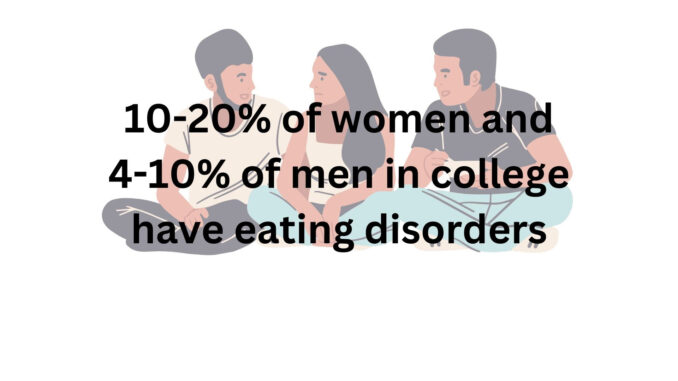
Julia Halvas | Staff Writer
Besides warning you to keep up with your classes and to join clubs on campus, most upperclassmen warn incoming students to not gain the “freshman 15.”
While I can understand that they’re trying to help me stay healthy, this freshman 15 concept is not a constructive way for them to help college students de-stress. This idea of fearing weight gain can cause people to hyperfixate on things like calorie counting and appearance, which ultimately causes more strain to mental health and self-love. This idea begins to consume these already busy college students’ brains, making them obsess over this idea of “am I going to gain weight?” or “am I being healthy?” which can distract them from their school work and other activities.
The freshman 15 relates to this idea of freshman going into college and becoming so run down, they no longer eat or exercise properly. This can lead freshmen weight gain and going home after the end of the first semester 15 pounds heavier than when they left in August.
The common cause of weight gain in college freshmen comes as a result of changing priorities in college. Many students barely have time to watch television or scroll through their phones, let alone exercise and eat healthily on a day-to-day basis. For many students, this is a huge change. Even though there is a natural, major shift in students’ lives, the toxicity from diet culture, which begins with this “freshman 15” complex, still continues to present itself on campus.
The freshman 15 is not a college student’s first run in with toxic diet culture. With social media now appealing to younger children and the constant pressure to fit in, kids as young as middle school are experiencing body dysmorphia and self hatred.
According to Psych Central, “Social media platforms often feature images of people with seemingly perfect faces and bodies, often using filters and photo editing tools to enhance their appearance.” This can become extremely problematic, especially for younger children, who aren’t even educated on nutrition as a whole.
With social media platforms, like Instagram, most of their users are teens. It is estimated that more than 38% of Instagram’s users are between the ages of 13 to 24. This means kids as young as middle school are being exposed to the toxicity revolving around diet culture.
For so many years, I was a part of it.
Beginning in middle school, when I got my first phone, I was like many other young girls, would scroll through social media every night and look not just at celebrities, but kids at my own school. I would constantly compare myself.
It wasn’t until later in high school when I discovered how much I let the toxicity ruin and control my everyday life. Even though it has taken a while, I have found some astonishing things on my self discovery journey. The truth is, the freshman 15, and weight gain in general is not always a horrible thing.
As you get older your body naturally goes through changes. There are many reasons this happens, but most of them are actually uncontrollable (ex. hormone imbalance, muscle loss, stress increase). Labeling this significant life change negatively as “freshman 15” will make college students feel self-conscious about their time in college, rather than full of joy at the memories of the good experiences.
Before, I hated working out. I hated going to the gym because it felt more like an obligation in today’s diet culture rather than a release of stress.
Today, I understand that going to the gym is not the only form of exercise. Walking in my neighborhood counts, too. Also, eating healthy doesn’t have to mean eating a salad for lunch and being full like the fad diets claim. We all need a piece of pizza every once and a while and there are so many amazing healthy recipes that satisfy your taste buds and nutritional needs. It’s hard for college students to plan around their schedule and students feel guilty because they’re comparing themselves to other students’ schedules, with the freshman 15 a looming embarrassment.
The threat of the freshman 15 should not dissuade us from seeking small joys throughout our everyday college experience, and the cumulative effects of toxic diet culture surely should not keep me from feeling guilty for wanting a night in after midterms instead of sticking to my gym routine.
With that said, it’s important to acknowledge that diet culture will never go away. It will continue to be presented to us in the media. We as college students, though, can overcome the freshman 15 mentality by enjoying it all instead: Savor the Chick-fil-A, finish that slice of Milano’s, enjoy the grilled chicken sandwich, even if it’s from Hogan. Worrying too much about the food can take away from the rest of the true college experience.
It is also important to acknowledge that just because you come home from college and weigh 15 pounds more than when you left, doesn’t mean you aren’t worthy or beautiful.
I’m out of high school, and all of the kids I went to school with for 12 years are little more than a distant memory, so why did I let their opinions mean so much to me? Why do all high schoolers let their peers dictate the way they feel about themselves?
Even now, no one’s going to remember if we gained the freshman 15. We shouldn’t let diet culture influence us now, hindering our experience in college, or ever.
Your worth is not defined by the number on the scale or how many salads you consumed. Years from now people aren’t going to care if you had pizza at the dining hall five nights in a row or if you skipped leg day.
So stop worrying, stop feeding yourself lies and go feed yourself some good food.

